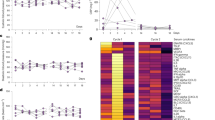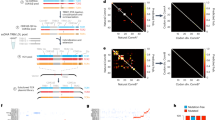Abstract
THE process of T-lymphocyte activation requires the participation of metabolically active non-θ-bearing accessory cells1. As first conclusively shown by Habu and Raff2, this requirement is also true of lectin-dependent triggering. Thus, T-cell activation by mitogenic lectins depends on the presence of la-positive non-T cells3,4. The mere binding of lectins such as concanavalin A (Con A) to the surface membrane of T cells does not trigger the cells to go through the mitotic cycle. This can only be achieved by the activity of growth factors present in conditioned media (CM) from Con A-stimulated cell cultures5. Such growth factors, however, cannot activate normal, resting T cells, although they are competent to maintain activated T cells in exponential growth for indefinite periods of time6. Hence, to be mitogenic a lectin must not only induce the in situ production of T-cell growth factors, but must also render resting T cells sensitive to the mitogenic activity of these growth factors. In this report we demonstrate that the binding of Con A to purified T cells can in a relatively short time, modify their functional sensitivity to growth factors, even though this binding is not sufficient to stimulate them to proliferate.
This is a preview of subscription content, access via your institution
Access options
Subscribe to this journal
Receive 51 print issues and online access
$199.00 per year
only $3.90 per issue
Buy this article
- Purchase on Springer Link
- Instant access to full article PDF
Prices may be subject to local taxes which are calculated during checkout
Similar content being viewed by others
References
Lafferty, K. J. & Woolnough, J. Immun. Rev. 35, 231 (1977).
Habu, S. & Raff, M. C. Eur. J. Immun. 7, 451 (1977).
Ahmann, G. B., Sachs, D. H. & Hodes, R. J. J. Immun. 121, 1981 (1978).
Andersson, J., Grönvik, K., Larsson, E.-L. & Coutinho, A. Eur. J. Immun. (in the press).
Gillis, S. & Smith, K. A. Nature 268, 154 (1977).
Countinho, A., Larsson, E.-L., Grönvik, K. & Andersson, J. Eur. J. Immun. (in the press).
Powell, A. E. & Leon, M. A. Expl Cell Res. 62, 315 (1970).
Novogrodsky, A. & Katcholski, E. Biochim. biophys. Acta 228, 579 (1971).
Gunther, G. R., Wang, J. L. & Edelman, G. M. J. Cell Biol. 62, 366 (1974).
Toyoshiwa, S., Iwata, M. & Osawa, T. Nature 264, 447 (1976).
Milner, S. M. Nature 268, 442 (1977).
Stenzel, K. H., Rubin, A. L. & Novogrodsky, A. Expl Cell Res. 115, 285 (1978).
Wigzell, H., Sundquist, K. G. & Yoshida, T. O. Scand. J. Immun. 1, 75 (1972).
Hämmerling, G. J. et al. Curr. Topics Microbiol. Immun. 81, 100 (1978).
Author information
Authors and Affiliations
Rights and permissions
About this article
Cite this article
LARSSON, EL., COUTINHO, A. The role of mitogenic lectins in T-cell triggering. Nature 280, 239–241 (1979). https://doi.org/10.1038/280239a0
Received:
Accepted:
Published:
Issue Date:
DOI: https://doi.org/10.1038/280239a0
This article is cited by
-
An immunohistologic study of the distribution and status of activation of head and neck tumor infiltrating leukocytes
Archives of Oto-Rhino-Laryngology (1987)
-
Stimulation of oligodendroglial proliferation and maturation by interleukin-2
Nature (1986)
-
Interleukin-2 (IL-2) and its receptor
Medical Oncology and Tumor Pharmacotherapy (1986)
-
Absence of growth by most receptor-expressing fetal thymocytes in the presence of interleukin-2
Nature (1985)
-
Early steps of lymphocyte activation bypassed by synergy between calcium ionophores and phorbol ester
Nature (1985)
Comments
By submitting a comment you agree to abide by our Terms and Community Guidelines. If you find something abusive or that does not comply with our terms or guidelines please flag it as inappropriate.



